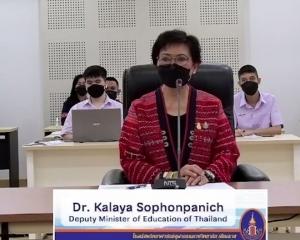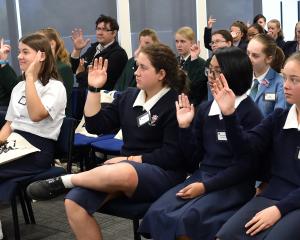Educationalist Jack Rutherford comments on the proposal to cut between 15 and 20 positions from the University of Otago College of Education.
It is understandable that some restructuring may be necessary at the University of Otago College of Education (ODT 27.5.10) due to financial strictures, but I read that it is the intention of the university to replace the lost positions with seven staff whose major strengths will be in research-active fields.
It is that emphasis that concerns me.
As a former honours graduate of Otago, I acknowledge the importance of research but nevertheless, the fundamental purposes of a teacher-training institution seem to me to be twofold: namely, to ensure that graduates have been enriched in their intellectual development but, just as importantly, to be prepared as adequately as possible to meet on the first day of their permanent appointment a group or 20 to 30 youngsters eager or reluctant or unprepared to learn.
In my time at teachers college, these two fundamental precepts of teacher training were met by two aims.
First, unlike some of the three northern national training institutions of that time, Dunedin made every effort to urge students to take university studies as well as their college courses.
Thus, when I was posting students to their bimonthly training in schools, I had to ensure, as far as possible, that students taking university subjects where lectures were timetabled during the school day had the time to attend them.
After all, right from its establishment in the 19th century, as the first teacher-training institution in the country, Dunedin Teachers College had always enjoyed and promoted a co-operative relationship with the university.
The second basic principle was to ensure that when graduates met their first class of pupils, they were as ready and able as far as was possible to help youngsters progress in their knowledge and personal development.
This was done by organising the college curriculum so that the first two years were devoted to a foundational understanding of the theory and principles of educating, rather than the more esoteric education.
Part of this programme included in the second year a more specialised understanding of these principles in two curriculum areas of the student's choice (outside the basic core subjects).
In their final year, students chose whether they wished to train in more depth in junior, middle or senior primary classes.
One of my responsibilities was to ensure that school postings reinforced that differentiation.
Then, in the final term of year three, the emphasis was on the preparation of one term's programme for whatever level the student had chosen.
Sure, for some, that programme may never have been used but at least for the less confident, it was an available backup.
The system was not perfect, and there were perhaps one or two of my colleagues who had been away from classrooms for so long that they had lost touch, but, nevertheless, its basic strength lay in the desire to ensure as far as possible that graduates could cope with at least the early days of facing the daily grind of many hours of lesson preparation, marking and what has now become the bureaucratic nightmare of the paper war which, for any conscientious teacher today, means many hours of evening toil, long after the school day has ceased.
While I respect and acknowledge the university's emphasis on research, I would counsel that to send young teachers into our schools with all the theory in the world but without the balance of knowledge of the principles and practice of classroom teaching and management, is to subject some of the graduates to a traumatic experience and also to do less than is right for youngsters and their parents.
The trick is to ensure an appropriate balance between research, theory and practical training.
Finally, when I left the college and became principal of a school called to meet the needs of youngsters from age 5 to 17, I have no hesitation in affirming that Dunedin Teachers College graduates, with one or two exceptions, were usually head and shoulders above their northern counterparts.
Let us ensure that Dunedin never loses that premier position by ensuring that research is balanced by practical classroom know-how.
• Jack Rutherford is a former reading adviser to Otago primary and secondary schools, lecturer in principles and practice of teaching, senior lecturer in practical training at Dunedin Teachers College and, finally, principal of Maniototo Area School. He lives in Ranfurly.











